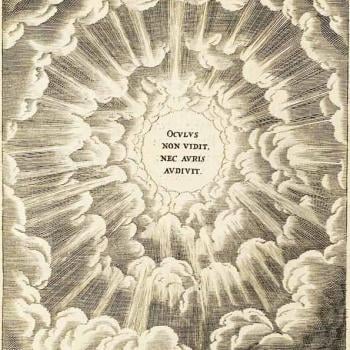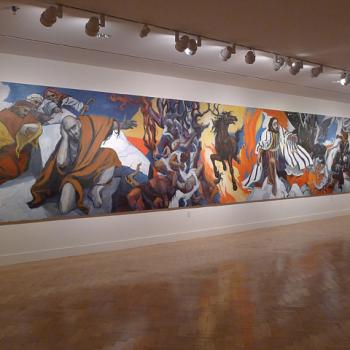 Theology, by its nature, will express itself in kataphatic forms. Most people will begin and end with kataphatic theology; it is what they are taught and it is what they believe. They have not been introduced to apophaticism and the limitations of kataphatic theology. They think the best way to discuss God is to take what has been given to them through positive dogmatic statements and discern secondary insights which they believe logically follow what they have already accepted. As they take conventions of the truth as absolute representations of the truth, and human reason as infallible in its ability, they let themselves wander far away from the truth through their secondary reifications of the truth. This is why it is important for those who teach theology to not only recognize the limitations of kataphatic theology themselves, but for them to explain those limitations as they teach others the doctrines of the Christian faith.
Theology, by its nature, will express itself in kataphatic forms. Most people will begin and end with kataphatic theology; it is what they are taught and it is what they believe. They have not been introduced to apophaticism and the limitations of kataphatic theology. They think the best way to discuss God is to take what has been given to them through positive dogmatic statements and discern secondary insights which they believe logically follow what they have already accepted. As they take conventions of the truth as absolute representations of the truth, and human reason as infallible in its ability, they let themselves wander far away from the truth through their secondary reifications of the truth. This is why it is important for those who teach theology to not only recognize the limitations of kataphatic theology themselves, but for them to explain those limitations as they teach others the doctrines of the Christian faith.
Dionysius revealed how kataphatic theological exploration works: the further away from the absolute truth, the more words, the more analogies, will be needed in order to represent the truth. Slowly, as the meaning implied by such analogies are assimilated, the analogies and the words used to express them will become useless and then actually hinder the apprehension of the truth by those overly attached to them. Teachers, when their students are inclined, will begin to explain the reason why analogies are being used. Analogies always rely upon the similarity and difference between the analogues; teaches must explain that we first start with the similarities being engaged by such analogies, but when the similarity is over-relied upon, we must deny the similarity by pointing to what differentiates the analogues. This is especially true for theology and discussion about God. God will always be greater, infinitely greater, than what can ever be suggested by analogies. Thus, teachers, once they discern the basic affirmation is understood, will have to explain to their students that the truth of God, which is greater than can be expressed, is best represented by silence. For any and all word used for God is used analogously, and so will have to be denied as God will be different from anything over said about him.
Dionysius explained that this truth lay behind the formulation and production of his three works, The Symbolic Theology, The Theological Outlines and The Divine Names. While each of them represents a form of kataphatic theology, they slowly move the reader from a purely symbolic understanding of God using many words to address who and what God is, giving a lesser insight with many words, to using less words while providing advanced students greater insights about God:
And I imagine that you have comprehended, how the lowest are expressed in somewhat more words than the first. For, it was necessary that the Theological Outlines, and the unfolding of the Divine Names should be expressed in fewer words than the Symbolic Theology; since, in proportion as we ascend to the higher, in such a degree the expressions are circumscribed by the contemplations of the things intelligible. As even now, when entering into the gloom which is above mind, we shall find, not a little speaking, but a complete absence of speech, and absence of conception.
Theology, discussion about God, is meant to take us from a mere awareness of God, and the positive discourse which are had in order to describe God and his activity, with all the discursive reasoning which is employed in such a discourse, to union with God and the enlightenment which comes through our experience of that union with God. We begin with inference, but end with real insight. But as we do so, we find ourselves moving out of our mind, out of our normal engagement with the world, into the gloom which is above mind, into the transcendent glory, unable to say a single word about God because we find all such words fail to attain who and what we have experienced. Likewise, because we experience God in a way beyond ourselves, beyond all our faculties of mind, our mind, no longer attached to thoughts as ways to deduce the qualities associated with God, have transcended not only words but the concepts and ideas which form the foundations for those words. We will discern the truth of this even before we attain that union with God because the more we find ourselves drawn to God and experience something of God, the more we will find ourselves elevated from our normal ways of being, and less we will find ourselves relying upon our own reflections about God to know God. This is why Dionysius said we will say less and less about God, reflecting less and less about God in and through discursive reasoning, in proportion to our awareness as we ascend to the higher and closer to God. The further away from God, the more we will speak and reflect upon God through mere inference; the closer we are to him, the less we will rely upon our thoughts and words, and the more we will rely upon silence to ascertain the truth of God.
Grosseteste therefore explained that the limited values of words and human thoughts in relation to the absolute truth also indicated how and why the greater the truth, the more we will depart from words, from the thoughts which lay behind the words, in order to let the truth be free from the restraints placed upon it by conventional approximations of the truth:
For the superior things are simplified in the measure of their superiority, and for that reason insights into them are less numerous, and as a consequence the words which signify the understanding of them are fewer. And when in our ascent we shall have made our way above the most simple of created things there shall be no short word but a total privation of the word, insofar as in Mystical Theology those who are entering the darkness are completely deprived of word and insight.[1]
Likewise, Ficino noted, in our ascent to higher and higher forms of the truth, the words and concepts which we do use will be less as they incorporate more of the truth in them. We begin with an imaginative discourse which employs many analogies, but then move up to a form of rationality of the mind apart from the imagination and its employment of sensual data, and then we will experience intuitive truth above what can be discerned by reason as we slowly progress away from words, so we will also progress in the kind if intellectual activity which is being engaged:
Imagination brings about with fewer acts whatever the many senses effect with many acts. Reason often embraces with one universal species the host of things that are perceived by way of imagination in many forms individually. Intellect sees with a motionless and sudden intuition what reason tries to trap by way of its varied discursiveness; and insofar as intellect is more sublime on account of the effectiveness both of its nature and its exemplary form, it knows and does many things by way of fewer things. [2]
In this fashion, Ficino indicated that the dark gloom was related to divine simplicity and the transcendence of God, where our grasping for the truth and presenting it in conceptual forms of understanding is silenced:
At length, in God Himself [who is] wholly superior to intellect, not only does [our] discursive argument cease, both interior and exterior, but so too does [our] understanding.[3]
This, once again, must be understood in relationship to our ascent to God, where we find ourselves united with him and yet transcended by him, so we experience and engage all that is through him and not through our own attempts to grasp after the truth in ourselves. We express this truth in silence and in discussions of the value of transcendent silence, when we meet those ready for such God-talk, but for others, we turn towards their needs and abilities and what they are ready to discuss, either through the intellect, through reason, through imagination and its analogies, or else, even through the simple things of the world seen and discerned by the senses. The goal is to lead people away from being need to be taught by us and our words and rather, to experience the truth for themselves.
[Image=The throne of etimasia/hetoimasia (<Gr. “preparation”), waiting for the Day of Judgment with the Gospel Book, the Cross and the instruments of Passion by Luciantodoran (Transfiguration Orthodox Church in Cluj-Napoca) [CC BY-SA 3.0 (https://creativecommons.org/licenses/by-sa/3.0) or GFDL (http://www.gnu.org/copyleft/fdl.html)], via Wikimedia Commons]
[1] Robert Grosseteste, “De Mystica Theologia” in Mystical Theology: The Glosses of Thomas Gallus and the Commentary of Robert Grosseteste on De Mystica Theologia. Trans. and ed. By James McEvoy (Parish: Peeters, 2003), 101.
[2] Marsilio Ficino, Mystical Theology in Marsilio Ficino: On Dionysius the Areopagite. Volume I: Mystical Theology and The Divine Names, Part I. trans. And ed. Michael J. B. Allen (Cambridge: Harvard University Press, 2015), 63.
[3] Marsilio Ficino, Mystical Theology, 65.
Stay in touch! Like A Little Bit of Nothing on Facebook












